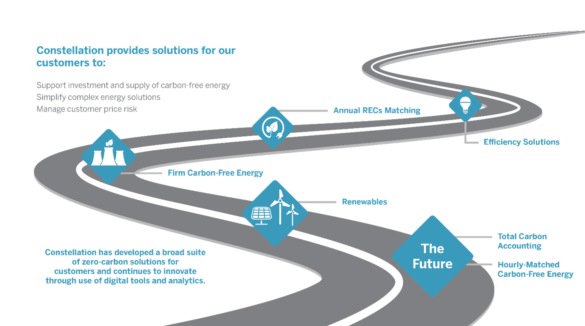Roadmap to Sustainability: Does Your Business Have A Plan in Place?
According to a 2021 MIT Study, over 90% of executives in the United States believe that sustainability is important; however, only 60% of companies have a sustainability strategy in place1. In an effort to make strong sustainability statements, many companies are setting ambitious climate goals, such as Constellation’s commitment to achieve 100% carbon-free energy generation and 100% reduction in operational emissions by 20402. Additionally, a recent study by McKinsey indicated that sustainability has become more of a concern for many consumers. Over 70% of consumers surveyed on purchasing practices across multiple industries indicated they would pay more for a green product versus a nongreen product if there were no differences in performance standards3. It is the right for companies to evaluate their sustainability strategy.
While some businesses may have the resources onsite to plan for and integrate sustainable practices into their business strategies, others may need assistance from energy experts, such as Constellation, who can provide insights to energy customers about the emerging trends in sustainability and help them develop and implement an integrated strategy to meet their business’ short- or long-term goals.
Constellation can help build a customized roadmap that incorporates your goals and budgets to recommend a plan with a gradual transition from brown to green power supply with minimum risk in the desired timelines. The plan would include utilizing some of our diverse sustainability products along with a vast group of qualified channel partners with novel technologies. Our Constellation Technology Ventures (CTV) portfolio companies can also be part of the strategy to help reduce demand and your business’ overall carbon footprint. Once a sustainability plan is in place, the roadmap could be help demonstrate the business’ commitment to sustainability.
The roadmap may start with initial steps that include analytics to help you better understand your energy and other utility usage and trends as well as other products that come with low incremental costs: the purchase of renewable energy certificates (RECs) and/or emission-free energy certificates (EFECs); and may end with the procurement of offsite renewables, efficiency upgrades or onsite solar and other behind the meter strategies to provide you with a robust plan that works best with your cost, risk profile and timelines.

A Sample Roadmap to Sustainability:
1. Understand your Facility Usage and Utility Bills
Understanding your facilities’ usage and utility bills is an essential first step to starting your sustainability journey. Utilizing a utility expense management platform such as Constellation Navigator Utility Bill Management Platform can help you manage data associated with your utilities, including energy, water, sewer, and diesel, into a valuable asset. It allows you to proactively manage and understand costs and trends, helping to develop better and more comprehensive strategies to optimize spend and drive your sustainability objectives. Our Utility Bill Management Platform will combine your utility bill data into an easy and accessible format that provides detailed reporting on your energy usage and allows you to communicate more effectively with all of your internal and external stakeholders on the progress being made on your sustainability goals.
2. The Purchase of EFECs and REC
EFECs represent the emission-free attributes of generating sources, as defined by PJM, that do not emit greenhouse gases, such as solar, wind, nuclear and hydropower. For example, when you purchase a Carbon-Free Electricity Plan from Constellation, the electricity you purchase will be matched with EFECs sourced primarily from carbon-free nuclear generation.
RECs, on the other hand, represent the emission-free attributes of one megawatt hour (MWh) of electricity generated by a renewable power plant, such as from wind or solar power.
“While investing in RECs or EFECs comes with a small incremental cost, it creates the opportunity for a business to quickly indicate to its customers and shareholders that it has started the process toward achieving sustainable practices,” says Raj Bazaj, Constellation’s executive director of retail power sales.
3. Energy Efficiency Upgrades
Energy efficiency upgrades come in the form of infrastructure improvements, such as LED lighting and HVAC upgrades. The Energy Made Efficiency (EME) program, which requires no upfront capital, is one example of Constellation’s service offering in this area. Under this program, customers can realize a cost savings by reducing energy consumption (and consequently carbon emissions), and the charges for efficiency projects appear on your energy bill.
4. Procurement of Offsite Renewables
Customers can achieve renewable goals and make a local offsite renewable energy purchase with a retail power supply contract through our Constellation Offsite Renewables (CORe) product. Through Constellation’s CORe and CORe+ solutions, customers have the ability to either integrate renewable energy purchases from existing renewable generation, including solar and wind facilities, into a load-following energy supply or support the development of new renewable energy assets on their regional grid, making a powerful sustainability claim.
5. Hourly Carbon-Free Energy Matching
Currently, most net zero clean energy supplies are accounted for by matching energy use with renewable and/or emission-free energy certificates on an annual basis, without considering where or when the energy was produced. Hourly carbon-free energy matching is an opportunity to streamline carbon accounting by matching electricity use with a local emission-free energy source in real time. Utilizing hour-by-hour regional tracking, Constellation’s 24/7 solution is intended to be the most advanced, real-time carbon accounting solution of its kind, going beyond other net zero programs that aggregate clean energy megawatts over time, and giving customers clearer and more accurate data on their emissions impact.
When it comes to setting goals for energy sustainability activities, it is critical to find the right energy solutions provider to help you navigate what can sometimes be an overwhelming and seemingly complicated process—one that can help ensure your organization is implementing a robust plan while staying updated and adjusting as needed to the rapidly changing landscape of new products and technology.
[2] Any emissions that cannot be technologically reduced by that time will be offset: Constellation commits to reducing methane emissions 30% from 2020 by 2030, aligned with the Administration’s global methane pledge
























